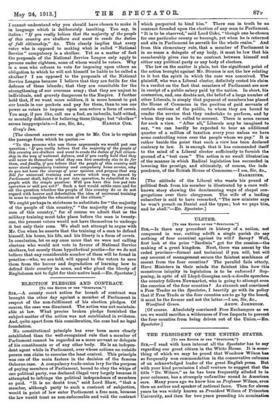ELECTION PLEDGES AND CONTRACT. [To THE EDITOR or THE -srEcnkroa."1
SIR,—A county court action for breach of contract was brought the other day against a member of Parliament in respect of the non-fulfilment of his election pledges. Of course, the case was dismissed. The action was not maintain- able at law. What precise broken pledge furnished the subject-matter of the action was not established in evidence. And, quite apart from this consideration, the case had no legal foundation.
No constitutional principle has ever been more clearly established than the well-recognized rule that a member of Parliament cannot be regarded as a mere servant or delegate of his constituents or of any other body. He.is an indepen- dent agent while in Parliament, over whose actions no outside person can claim to exercise the least control. This principle was one of the main factors in the decision of the famous Osborne case. A compulsory trade-union levy for the purpose of paying members of Parliament, bound to obey the whips of one political party, was declared illegal very largely because it attempted to infringe the political independence of members so paid. "It is no doubt true," said Lord Shaw, "that a member, although party to such a contract of subjection, would in point of law enter Parliament a free man, because the law would treat as non-enforceable and void the contract
which purported to bind him." There can in truth be no contract founded upon the election of any man to Parliament. "It is to be observed," said Lord Coke, " though one be chosen for one particular county or borough, yet when he is returned and sits in Parliament he serveth for the whole realm." And from this elementary rule, that a member of Parliament is in no sense a delegate of any body, it must be law that his membership gives rise to no contract between himself and either any political party or any body of electors.
The law on the matter is plain, but the significant point of the action brought against Mr. Strauss is not the law relating to it but the spirit in which the case was conceived. The plaintiff, who was a Liberal elector, definitely rested his claim to a verdict on the fact that members of Parliament are now in receipt of a public salary paid by the nation. In short, his contention, and, one doubts not, the belief of a large number of other Liberals, is simply that payment of members has placed the House of Commons in the position of paid servants of certain sections of the public, to whom they are bound to render the service that they undertake to perform, and by whom they can be called to account. There is some excuse for such a view. "After all," Liberals may be imagined to say, "we can hardly be expected to bear an additional quarter of a million of taxation every year unless we have some controlling voice over the people whom we pay." It is rather beside the point that such a view has been declared contrary to law. It is enough that it has commended itself to the mind of a Liberal elector sufficiently to furnish the ground of a "test case." The action is no small illustration of the manner in which Radical legislation has succeeded in lowering the prestige, and ultimately, of course, the inde pendence, of the British House of Commons.—I am, Sir, &c.,
BARRISTER.
[The attitude of the Liberal who wants his pound of political flesh from his member is illustrated by a once well- known story showing the domineering ways of chapel con- gregations over their clergymen. The wife of a leading subscriber is said to have remarked, "The new minister says he won't preach on Daniel and the types ; but we pays him, and he shall."—ED. Spectator.]










































 Previous page
Previous page